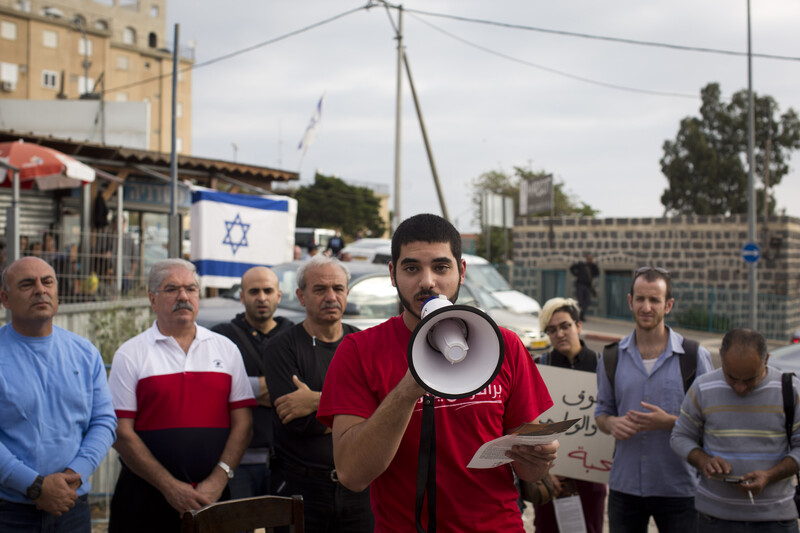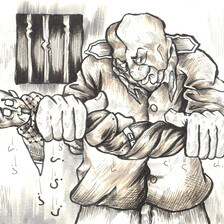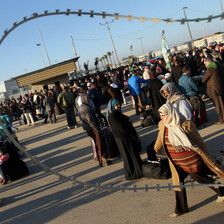The Electronic Intifada Haifa 2 January 2014

Omar Saad is among a growing number of Druze youth ready to face jail rather than join the Israeli army.
ActiveStillsSeveral Palestinian citizens of Israel from the Druze religious community are in prison for refusing to serve in the Israeli military.
“How can I serve in Israel’s occupation army?” said Seif Abu Seif, an 18-year-old Druze recently jailed for refusing military service. “I cannot stand at the border and stop its people from entering. I am an Arab.”
Omar Saad, whose refusal was widely publicized on the Internet after he wrote an open letter to Israeli Prime Minister Benyamin Netanyahu in 2012, is currently serving twenty days in military prison, along with Mahmoud Saad and Nizar Abu Hammoud.
There are several more jailed Druze conscientious objectors who have remained anonymous.
On 24 December, Israeli officers came to Abu Seif’s home in Shefa Amr — a Palestinian town in the Galilee region of present-day Israel — detained him, and took him to a nearby military induction base. There, he declared his refusal to serve in the army. This was the second time that Abu Seif had been detained during December.
After being held for less than a week, he was temporarily released on medical grounds relating to a pre-existing heart condition.
“Psychological stress”
“They put psychological stress on me in prison,” said Abu Seif, who, during his detention, was held in solitary confinement after refusing to cut his hair for religious reasons.
Later this month, he will have to declare his refusal to join the army yet again. It is likely that he will be arrested and imprisoned after he makes this declaration.
All male Druze citizens of Israel are required to serve in the military as part of an agreement between the state and community leaders that dates back to 1956. Yet there have always been individuals who have refused for moral, political or religious reasons.
Along with others, 22-year-old activist Maisan Hamdan coordinates activities for The Group Against Compulsory Service, which supports conscientious objectors from the Druze community.
“We want young people who are against serving in the military to come to us, that’s why we’re here,” Hamdan said. “In every Druze village there are people who don’t want to serve in the army.”
The group provides both legal and moral support to conscientious objectors. It has staged a number of protests outside Israeli military prisons to demonstrate solidarity. On 14 December, the group helped organize a protest outside Israel’s Prison Six. It plans to hold another demonstration there on 4 January.
Hamdan said that Druze boys are pressured to serve in the military from a young age from both within Druze society and from the state. “It starts in the family and in public schools, where the idea is planted in the kids.”
“Fear to refuse”
Israel also treats Jewish and Druze conscientious objectors differently. While Jewish Israelis can obtain exemptions on conscientious grounds, Druze cannot. “There is still a lot of fear to refuse,” said Hamdan.
This pressure means that many young people do not to go public with their refusal and instead seek exemptions by intentionally failing mental aptitude tests. The Israeli military classifies these exemptions as “Profile 21.”
Sahar Vardi, an activist who works with New Profile, a group opposing the militarization of Israeli society, explained that the state uses a number of tactics to deter members of the Druze community from rejecting military service. Most significant among those is the lack of economic opportunities in Palestinian towns and villages in present-day Israel.
“This leads many Druze to become career soldiers … it’s a steady job,” Vahar told The Electronic Intifada, explaining that after finishing their service, they have a better opportunity to “receive land from the state to build on.”
The willingness to serve in the military is partially born from desperation caused by geographic “confinement to their [towns and villages] and because many of their lands have been confiscated” in the past, she added.
Wadah al-Qasim, 33, is a Druze citizen who briefly went to prison after he refused to serve in Israel’s army more than a decade ago.
Speaking to The Electronic Intifada by telephone, al-Qasim said: “The numbers [of conscientious objectors] are always increasing … I think that in the next ten years the majority of Druze will refuse to serve in the military.”
Al-Qasim is from al-Rama, a village in the northern Galilee region. His 74-year-old father is the renowned Palestinian poet Samih al-Qasim, who spent several stints in jail for refusing military service as well as for communist activism.
Israel “tried to brainwash us”
“The state has tried to brainwash us for over sixty years by telling us that we are not Arabs, that Muslims and Arabs want to kill us,” Wadah al-Qasim said.
Yet more and more Druze youth are seeing through Israeli propaganda.
“The biggest thing is the lack of access to land … But today there is a growing consciousness, not like when I was in jail and nobody cared about it in the media or even knew that there was Druze who didn’t serve in the army,” al-Qasim explained.
As a growing number of Druze refuse to serve in Israel’s army, the state has sought to recruit more Palestinian citizens of Israel into military service by targeting the Palestinian Christian minority.
Other Israeli measures attempt to increase the number of Palestinian citizens who participate in the national service program.
Israel’s parliament, the Knesset, also recently discussed a bill that would discriminate against all citizens that don’t serve in the military. The proposed bill aims to “set out rights for those who contribute to the state,” the Israeli daily Haaretz has reported (“Israeli bill that benefits veterans discriminates against Israeli Arabs,” 18 November 2013).
Yet “there is more solidarity from both Arab society and abroad with Druze who don’t serve in the military than ever before,” according to Maisan Hamdan.
“Before, nobody knew about this, but now people know much more and feel solidarity with us.”
Patrick O. Strickland is an independent journalist and frequent contributor at The Electronic Intifada. Find his writing at www.patrickostrickland.com, and follow him on Twitter @P_Strickland_.





